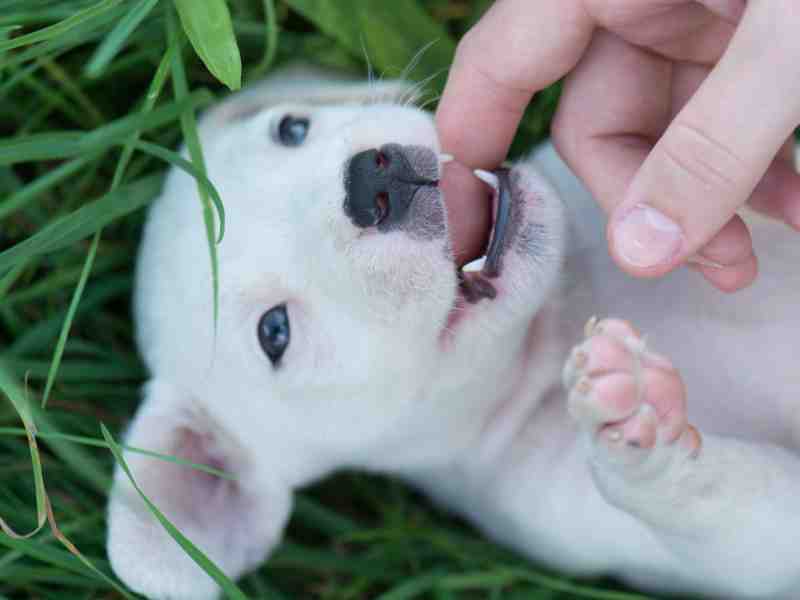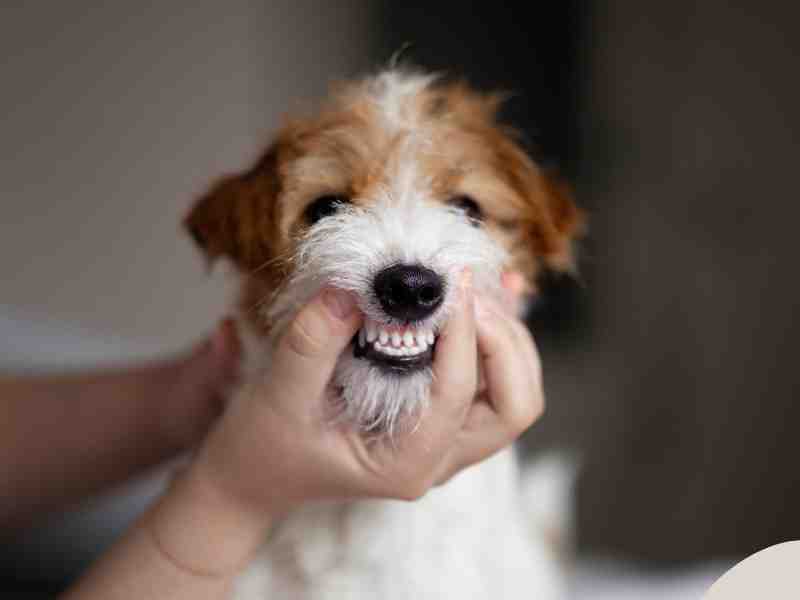When you bring a squirmy, adorable new family member into your life, you probably pay close attention to their diet, exercise, toys and first vet visits. Too often, though, when we bring them home, we tend to overlook an important part of overall health–dental care for puppies. Surprisingly, the key to unlocking overall vitality and health for your puppy isn’t just in what they eat or how they play and train, but also in the care of their teeth and gums. Oral hygiene in puppies and their gut microbiome are interconnected, and making sure you take care of both is the key to your puppy’s long, healthy, and happy life.
Understanding Puppy Oral Health: Beyond the Basics
When it comes to nurturing a healthy and happy puppy, we are typically well-versed in the basics—exercise, bonding, well-checks, and nutrition advice for puppies are easily accessible and known about. That’s because they’re important in the earliest days of your dog by offering the best start to life, ensuring protection against diseases, fostering healthy growth, and building the physical energy and logic necessary for a puppy’s playful and energetic lifestyle.
But, in addition to those foundational concepts we know about, a critical part of puppy health is often overlooked: their oral health. Oh sure, we pay attention to puppy teeth when those sharp little things make their marks on our arms or ankles, but there’s definitely more to puppy dental care than just avoiding getting snagged and watching baby teeth fall out. It’s more than preventing bad breath after they grow out of that puppy breath and even more than just brushing their teeth to keep them free from plaque buildup and tartar buildup as they grow.
The important thing to know is that there is a significant link between dog oral health and their gut--a healthy mouth actually helps develop a healthy body, and starting puppy dental care is the key to helping them live their longest lives. Their mouth serves as a gateway to the rest of them, and issues in a puppy’s mouth can signal or lead to systemic health problems, affecting everything from digestion to heart health.
The Science of Microbiomes in Dogs
The dog microbiome refers to the complex community of microorganisms living in and on our best friends. These microorganisms include bacteria, viruses, fungi, and protozoa. The gut microbiome plays an important role in the health and well-being of your dog, influencing everything from nutrient absorption and digestion to immune function and even their behavior. But the oral microbiome in dogs plays an important part in not just their dental health but their overall health too.
The Dog Gut-Oral Health Connection: A Tale of Two Microbiomes
Just like in humans, there’s a fascinating connection between the gut and oral microbiomes. You might think the mouth and the gut are separate body systems altogether, but they’re more like best friends who profoundly influence each other’s lives. Here’s what the science tells us about the oral-gut connection in dogs.
Pathway from Mouth to Gut
It all starts with a lick, a chew, or a swallow. Your dog’s mouth is the entry point for bacteria that end up in the gut. A healthy oral microbiome in dogs can mean good news for the gut and help maintain a balanced community of microbes. The problems come if harmful bacteria dominate your puppy’s mouth. Those harmful bacteria can hitch a ride to the gut and cause trouble, like a gatecrasher at a party who ends up causing a scene. And since puppies are prone to putting just about any and everything they can in their mouths, it’s really important to pay attention to their oral health.
Feedback Loop for Oral and Gut Microbiomes In Dogs
There’s a constant back-and-forth communication between your dog’s gut and mouth. If the gut microbiome is out of whack, it can lead to oral health issues and vice versa. This interconnected relationship shows how important it is to care for both the mouth and the gut. Think of them as siblings in the backseat of the car on a road trip; if one is unhappy, the other is likely to feel it, too.
Influence of Dog Diet On A Dog’s Dental Health
The thing about your dog’s diet is that it plays a critical role in the health of both microbiomes. Foods rich in fibers can act like a feast for the good bacteria in the gut, promoting a healthy microbiome, which in turn supports oral health. On the flip side, a diet high in sugars and processed foods can do the opposite, encouraging harmful bacteria in both the mouth and gut. That’s why watching the type of food and treat you give your puppy is important, especially as puppies tend to get lots of ‘treats’ in training. Treats may entice better behavior, but if they’re not good for your dog’s teeth or gut, they could subtly undermine your puppy’s desire to behave, as the health of the gut microbiome affects mood and behavior.
The Impact of Neglecting Dental Health In Dogs
As we said, dental care in puppies isn’t just about dealing with bad breath or keeping those pearly whites gleaming; it’s a gateway to a whole host of health issues that can affect more than just their mouths. When oral hygiene is overlooked, even young dogs can develop plaque and tartar buildup, leading to periodontal disease. This might sound like it would only affect their gums and teeth, but the truth is that periodontal disease in dogs can have systemic effects, and a majority of dogs have some form of dental disease by the time they’re three years old. Bacteria from the mouth can enter the bloodstream, potentially affecting their heart, liver, and kidneys. Poor oral health is also associated with painful infections, tooth loss, and can contribute to difficulties in eating, which in turn impacts a puppy’s nutritional intake and overall health. And yes, issues with your dog’s teeth can start in puppyhood.
When to Start Dental Care For Dogs?
The consensus among veterinarians is clear: early is better when it comes to dog dental care. The ideal time to start is as soon as you bring your puppy home. Initially, this doesn’t necessarily mean brushing their teeth right away but rather getting them accustomed to having their mouth and teeth touched and inspected. This can help ease them into a routine of regular dental care. The earlier you start brushing, the easier it will be to incorporate into a dog oral hygiene routine.
By the time your puppy is around 8-12 weeks old, you can start introducing a soft toothbrush and pet-safe toothpaste. It’s crucial to use products specifically designed for dogs, as human toothpaste can contain ingredients like xylitol, which is toxic to dogs. Starting early helps prevent dental diseases and acclimates your puppy to the process, making it a normal part of their grooming routine, instead of a stressful or frightening experience.
Implementing a dog dental care routine early on includes regular brushing, dental toys and dental dog chews. Your vet will also take a good look at gums, tongue, and teeth at each well-check, looking for signs of problems. This proactive approach can significantly reduce the risk of dental diseases and contribute to a longer, healthier life for your dog.
Implementing a Daily Oral Health Routine For Your Puppy
Creating and maintaining your puppy’s daily oral health routine doesn’t have to be scary. With a few simple steps, you can significantly impact your puppy’s dental health and overall well-being and potentially extend their lifespan. Here are some easy steps you can start today:
- Gradual Introduction: Begin by getting your puppy used to having their mouth and teeth touched. Use positive reinforcement, such as praise or (healthy, low-carb) treats, to build positive associations with dental care activities.
- Select the Right Tools: Choose a soft-bristled toothbrush designed for dogs and pet-safe toothpaste. Human toothpaste contains ingredients that can be harmful to dogs.
- Regular Brushing: Try to brush your dog’s teeth daily, but if that’s not possible, go for a minimum of three times a week. Consistency is key to preventing plaque and tartar buildup and getting them used to the routine.
- Chew Toys and Dental Treats: Incorporate chew toys, treats, and chews into your dog’s routine. These can help reduce plaque and tartar mechanically, just like brushing does.
Beyond Brushing Your Puppy’s Teeth – Comprehensive Care For Good Oral Health
While brushing is a basic, we know that oral health doesn’t stop there. That’s why we created Bernie’s Charming Chompers. We knew how important oral health and gut health in dogs were, and when we started looking for dental chews for Bernie and Lady, we didn’t like what we saw. We wanted a chew that wasn’t like traditional chews that focused solely on cleaning teeth and freshening breath because we didn’t love what the other ingredients did for a dog’s gut. We designed Charming Chompers with a dual purpose in mind: to address oral hygiene mechanically with abrasion and scaling and to support gut health through carefully selected ingredients. We wanted something that worked the second it went inside our dogs’ mouths and worked from the inside out to give them the best dental and gut support.
Each of the ingredients we chose was purposed to do this. They include:
- Fiber: Key to digestive health, fiber helps to bulk up stools and promotes regular bowel movements in dogs. It also helps in the mechanical cleaning of teeth, as the chewing action helps to reduce plaque and tartar buildup. We include sweet potatoes as they’re a rich source of dietary fiber and vitamins. Along with pumpkin, another excellent source of fiber that contains immune health vitamins, these ingredients are power punches for healthy guts and clean teeth.
- Prebiotics: These are non-digestible fibers that feed the beneficial bacteria (probiotics) in your dog’s gut. By promoting the growth of good bacteria, prebiotics help maintain a balanced gut microbiome, which is essential for overall health and can also impact oral health.
- Postbiotics: These are the helpful compounds created when probiotics feed on prebiotics. They include short-chain fatty acids that are vital for gut health and can help reduce inflammation, potentially benefiting oral health as well.
And of course, dogs go crazy for the real turkey we include. Our thought process was this: Why not make a dog dental chew that was delicious, cleaned their teeth, and took care of their gut health all in one? If they were going to be chewing on something anyway, we wanted it to be good for them.
True oral health starts in the gut. Giving your puppy the gift of a healthy oral and gut microbiome can be delicious with Charming Chompers. We recommend Charming Chompers for puppies who are six months or older (they’ve generally lost all their puppy teeth by this time and have their permanent chompers) to enhance their dental care routine, setting them on a path to lifelong oral health and happiness. And, it’ll be a gift that continues to promote their good health long after their adorable puppy chewing ends.


